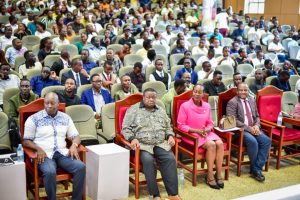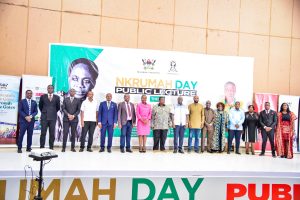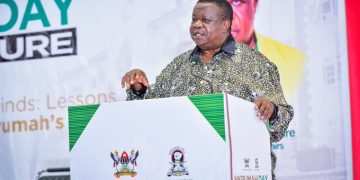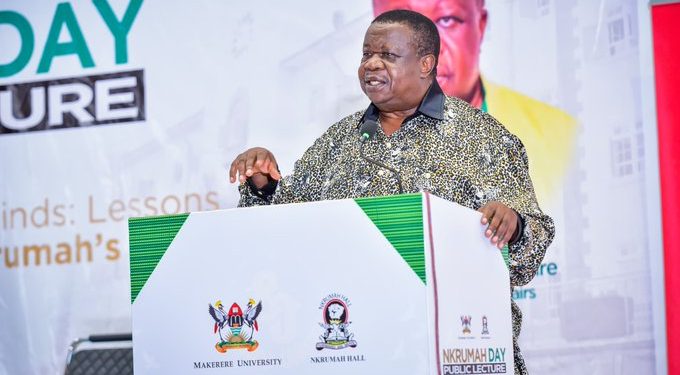Hon. Gen Kahinda Otafiire, Minister of Internal Affairs and a long-standing Pan-African advocate, says only African unity can achieve lasting peace and prosperity of the continent, warning against the divisive impact of colonial borders and ethnic divisions.
He made the remarks on Friday while delivering his keynote address at the 3rd annual Kwame Nkrumah Day hosted by Makerere University under the theme, “Transforming Young African Minds: Lessons from Kwame Nkrumah’s Ideas.”
The celebration held in the Yusuf Lule Auditorium, Central Teaching Facility (CTF), brought together students, faculty, and distinguished guests to reflect on the enduring legacy of Ghana’s first President, Kwame Nkrumah, and to inspire a new generation of African leaders.
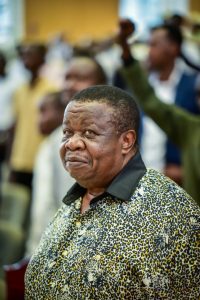
In a speech that blended personal experience, history, and a call to action, Gen Otafiire reflected on his time at Makerere University, where student activism and leadership were the bedrock of Uganda’s freedom movement.
“53 years ago, when I walked through the gates of Makerere as a student, Nkrumah Hall was called New Hall and the warden was the late Prof. Apollo Nsibambi,” Gen Otafiire recalled. “I joined the Guild Council in my first year, and among the first things we did was to rename New Hall to Nkrumah Hall.”
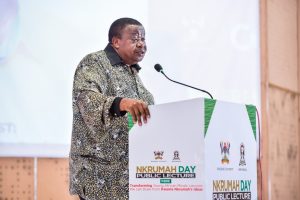
The General’s remarks highlighted how student leadership at Makerere served as a crucible for Uganda’s political and social transformation. “At Makerere, I came in as a student and left the university with a paper degree, but also a freedom-fighting qualification. In my second year, we became part-time students and full-time guerrillas fighting Idi Amin. The balkanization of Africa is what leads to the rise of the Idi Amins,” he said.
Africa’s Greatest Existential Threat
Gen Otafiire centred on the theme of African unity, warning against the divisive impact of colonial borders and ethnic divisions. “Africa is the cradle of mankind, yet we remain the most disadvantaged people of all humanity. I see many of you identifying as Baganda, Banyankole, Acholi, and so forth—but that is living a lie. These colonial borders you use to define yourselves were drawn without a single African at the table. I will go to my grave content when all of you begin to proudly identify simply as Africans,” he urged.
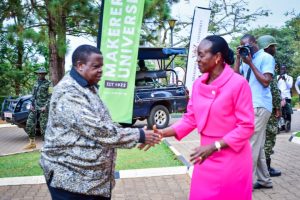
Divisionism, the General warned, remains one of Africa’s greatest existential threats. “Divisionism is an existential threat to Africa; we divide ourselves, buy arms, and kill each other. Ladies and Gentlemen, don’t buy that—what we have already paid for is peace and liberty,” he said, emphasising that unity is essential for Africa’s prosperity.
Gen Otafiire traced his lifelong commitment to Pan-Africanism to the inspiration he drew from icons such as Marcus Garvey, Kwame Nkrumah, and Patrice Lumumba. “I am standing on the shoulders of giants. I am also the seventh president carrying the torch of Pan-Africanism. Why? Because Africa is the product of mankind, and yet we are the most disadvantaged single group of all mankind,” he said.
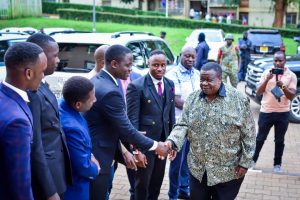
Divisive Colonial Borders
He underscored that Africa’s borders, drawn without African input, have been a source of persistent division and conflict. “If the eastern border of Congo had been put in Mombasa, there would be no Uganda, there would be no Kenya; we would all be Congolese. And you are proud of these borders which bind you, yet were determined without the input of your forebears?” Gen Otafiire challenged, calling on students to critically examine the historical forces that shape their identities.
In a candid reflection on Uganda’s own turbulent history, Gen Otafiire recounted the university’s interaction with Idi Amin. “Makerere, the oldest university in East Africa, awarded him an honorary PhD for exemplary leadership. This man started butchering Ugandans from day one. For you to award Amin a PhD for honorary leadership—what did you expect history to say about you?” he asked.
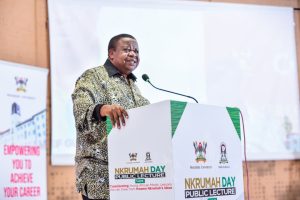
He highlighted how these events shaped the resolve of young activists to confront injustice and pursue freedom.
Inspiring Next Generation of Leaders
Beyond historical reflection, the General urged young people to harness their unique qualities for leadership and innovation. “Young people have a unique attribute: you are idealistic, you are creative, you are not inhibited by the normal realities that grow as we age. Whether in politics, business, or technology, young people drive change. The companies running the world today were started by young people,” he observed.

Gen Otafiire also spoke on intra-African cooperation and economic empowerment, emphasising that African solutions must come from Africans themselves. “We have to recognise that our trade goods are not allowed into some countries in our own region. We need to work together, share our ideas, our development planning, and our resources. African solutions to African problems must start with us,” he said.
African Citizens First
His address combined a personal narrative with lessons for the continent’s future. Drawing from his experience in conflict zones and across African nations, Gen Otafiire encouraged students to see themselves as African citizens first, transcending narrow ethnic or national identities.
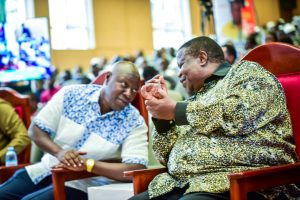
“When you think you are inheriting the legacy of Kwame Nkrumah, and you still think you are a Munyankore, Acholi, Musoga, etc, you are living a lie. I am an African. My country is Africa, from the East African province of Africa, and the district of Uganda. The sub-county of Ankore,” Gen Otafiire noted to resounding applause. “You have to be Africans. When you identify as citizens of Africa, I’ll go to my grave very comfortably,” he said.
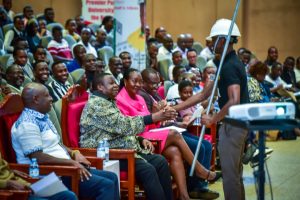
Gen Otafiire concluded with a powerful call for vigilance, unity, and intergenerational responsibility. “We can only liberate ourselves by uniting our people. Our greatest wealth is peace and liberty. These were won through sacrifice, and it is our duty to safeguard them,” he said, urging young Africans to carry forward the vision of Kwame Nkrumah.
The Makerere Nkrumah Day celebration serves not only as a commemoration of Africa’s past struggles but also as a roadmap for its future. By drawing lessons from Nkrumah’s life and ideology, students were reminded that unity, civic engagement, and critical consciousness remain central to transforming African societies.
